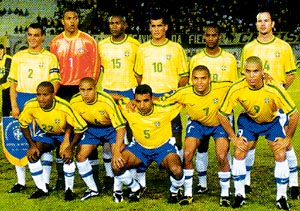
Some 70,000 construction workers in South Africa have gone on strike, halting work on stadiums being built for the 2010 World Cup.
Unions are threatening to wreck the tournament if their demands for a 13% wage increase are not met.
Organisers say they are confident the grounds will still be ready, unless the strike continues for months.
On Monday judges rejected a request from the employers to outlaw the strike, which unions say is indefinite.
The BBC's Mpho Lakaje in Soweto says scores of workers are outside Soccer City stadium wearing blue overalls and brandishing sticks.
"We are struggling for our country," they chanted after downing their tools at midday.
The government must help us, otherwise we are going to delay 2010
Union spokesman Lesiba Seshoka
South Africa passes World Cup test
Soccer City union organiser Patrick Geqeza blamed management inflexibility for precipitating the strike.
"We feel bad about going on strike. [But] they don't want to meet us half way," he told AP news agency.
At present most of the workers are being paid 2,500 rand ($310; £192) a month.
Map of stadiums The National Union of Mineworkers (NUM), whose members include construction workers, has rejected the 10% wage increase offer from employers.
World Cup: One year to go
"The government must help us, otherwise we are going to delay 2010. We will strike until 2011," AFP news agency quoted NUM spokesman Lesiba Seshoka as saying.
Protesters outside Durban's Moses Mabhida Stadium were forced to disperse because their application to protest was turned down, the South African Press Association reported.
Before they left, the NUM's Bhekani Ngcobo told workers the union would make sure that no temporary labourers were employed.
Five entirely new stadiums are being built for the World Cup, while five are being modernised.
Danny Jordaan, head of the World Cup organising committee, said he respected the right of the workers to strike but felt the dispute would be resolved without affecting the construction schedule.
"The construction workers have been the lifeblood of the 2010 Fifa World Cup project," he said in a statement.
"Their hard work has ensured that we are on track to meet our deadlines and that our stadiums will be among the best in the world next year."
Correspondents say if the strike continues projects such as the high-speed rail link between the airport and Johannesburg will be of greater concern than the stadiums.
The rail-link is scheduled to be operational just two weeks before the tournament starts.
The next World Cup will be the first to be hosted by an African country.
Unions are threatening to wreck the tournament if their demands for a 13% wage increase are not met.
Organisers say they are confident the grounds will still be ready, unless the strike continues for months.
On Monday judges rejected a request from the employers to outlaw the strike, which unions say is indefinite.
The BBC's Mpho Lakaje in Soweto says scores of workers are outside Soccer City stadium wearing blue overalls and brandishing sticks.
"We are struggling for our country," they chanted after downing their tools at midday.
The government must help us, otherwise we are going to delay 2010
Union spokesman Lesiba Seshoka
South Africa passes World Cup test
Soccer City union organiser Patrick Geqeza blamed management inflexibility for precipitating the strike.
"We feel bad about going on strike. [But] they don't want to meet us half way," he told AP news agency.
At present most of the workers are being paid 2,500 rand ($310; £192) a month.
Map of stadiums The National Union of Mineworkers (NUM), whose members include construction workers, has rejected the 10% wage increase offer from employers.
World Cup: One year to go
"The government must help us, otherwise we are going to delay 2010. We will strike until 2011," AFP news agency quoted NUM spokesman Lesiba Seshoka as saying.
Protesters outside Durban's Moses Mabhida Stadium were forced to disperse because their application to protest was turned down, the South African Press Association reported.
Before they left, the NUM's Bhekani Ngcobo told workers the union would make sure that no temporary labourers were employed.
Five entirely new stadiums are being built for the World Cup, while five are being modernised.
Danny Jordaan, head of the World Cup organising committee, said he respected the right of the workers to strike but felt the dispute would be resolved without affecting the construction schedule.
"The construction workers have been the lifeblood of the 2010 Fifa World Cup project," he said in a statement.
"Their hard work has ensured that we are on track to meet our deadlines and that our stadiums will be among the best in the world next year."
Correspondents say if the strike continues projects such as the high-speed rail link between the airport and Johannesburg will be of greater concern than the stadiums.
The rail-link is scheduled to be operational just two weeks before the tournament starts.
The next World Cup will be the first to be hosted by an African country.



























